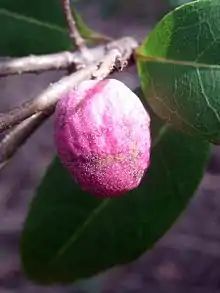Notelaea ligustrina
Notelaea ligustrina, known as the privet mock olive, native olive, doral or silkwood, is a plant in the olive family, found in south eastern Australia. Growing in and near rainforests south of Monga National Park in New South Wales, and into Victoria and the island state of Tasmania.[2] The specific epithet ligustrina refers to the Privet, which it resembles.[3]
| Privet mock olive | |
|---|---|
 | |
| Mount Imlay, Australia | |
| Scientific classification | |
| Kingdom: | Plantae |
| Clade: | Tracheophytes |
| Clade: | Angiosperms |
| Clade: | Eudicots |
| Clade: | Asterids |
| Order: | Lamiales |
| Family: | Oleaceae |
| Genus: | Notelaea |
| Species: | N. ligustrina |
| Binomial name | |
| Notelaea ligustrina Vent.[1] | |
| Synonyms | |
|
Nestegis ligustrina (Vent.) L.A.S.Johnson | |
It is a shrub or small tree and grows up to 16 metres tall and with a trunk diameter of 80 cm. It features dull, hairless leaves that are 3 to 10 cm long and 10 to 25 mm wide. Leaf stems are purple in colour and 2 to 5 mm long. Greenish yellow flowers form on racemes from the leaf axils, from January to April. Relatively large fruit mature from summer to Easter and are up to 10 mm in diameter. White, or colours between pink to dark purple. Though edible and often heavy yielding, the fruit have a large pip and a strong, bitter taste which gives them little food value.
References
- "Notelaea ligustrina Vent". The Plant List. Retrieved 16 July 2013.
- "Nestegis ligustrina". PlantNET - NSW Flora Online, retrieved 27 January 2011.
- Floyd, A. G. (2008). Rainforest Trees of Mainland South-eastern Australia (2nd, Revised ed.). Lismore, New South Wales: Terania Rainforest Publishing. p. 273. ISBN 978-0-958943-67-3. Retrieved 27 January 2011.